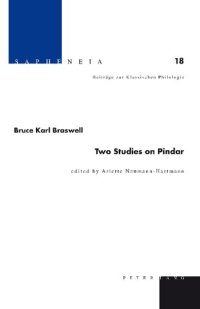
Ebook: Two Studies on Pindar: edited by Arlette Neumann-Hartmann
- Series: Sapheneia: Beitraege zur klassischen Philologie / Contributions à la philologie classique / Contributions to Classical Philology, 18
- Year: 2015
- Publisher: Peter Lang AG
- Edition: New
- Language: English
- pdf
The late Bruce Karl Braswell worked on Pindar for decades. Besides many smaller contributions, his research resulted in fundamental commentaries on Pythian Four (1988), Nemean One (1992), and Nemean Nine (1998), and his last monograph, dedicated to Didymos of Alexandria and his ancient commentary on Pindar (2013). Two substantial, self-contained manuscript fragments were found in his papers after his death. Their originality and innovative methodological approach justify their posthumous publication.
Part I of the present volume contains the fragment of Braswell’s planned study, A Contribution to the History of Pindaric Scholarship. Using the example of Nemean Nine, Braswell traces the history of Pindar interpretation from Antiquity to the end of the 16th century. The source texts for his exegesis appear as an appendix to the study.
Part II contains the completed fragment of A Commentary on Pindar Nemean Ten. Alongside the original text and translation of the first two triads of this ode, this section includes a detailed verse-by-verse commentary and the text and translation of the relevant scholia. The commentary on the first triad is supplemented by an extensive appendix on the Argive legends and monuments reported by Pausanias. In brief introductions, the editor recounts the origins of the manuscripts and their preparation for print.
Part I of the present volume contains the fragment of Braswell’s planned study, A Contribution to the History of Pindaric Scholarship. Using the example of Nemean Nine, Braswell traces the history of Pindar interpretation from Antiquity to the end of the 16th century. The source texts for his exegesis appear as an appendix to the study.
Part II contains the completed fragment of A Commentary on Pindar Nemean Ten. Alongside the original text and translation of the first two triads of this ode, this section includes a detailed verse-by-verse commentary and the text and translation of the relevant scholia. The commentary on the first triad is supplemented by an extensive appendix on the Argive legends and monuments reported by Pausanias. In brief introductions, the editor recounts the origins of the manuscripts and their preparation for print.
Download the book Two Studies on Pindar: edited by Arlette Neumann-Hartmann for free or read online
Continue reading on any device:

Last viewed books
Related books
{related-news}
Comments (0)